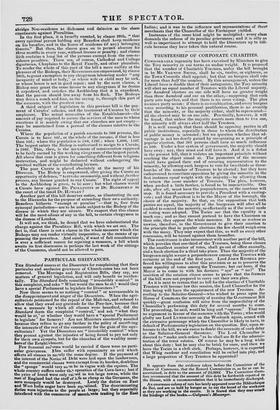PARTICULAR GRIEVANCES.
THE Standard sneers at the Dissenters for complaining that their particular and exclusive grievance of Church-rates has not been removed. The Marriage and Registration Bills, they say, are matters of general legislation, and will only benefit us inciden- tally. The Standard finds something " irresistibly comical " in this complaint, and asks " What would the men beat? would they have a special Parliament to legislate for Dissenters ?"
Now there seems to us nothing " comical " or unreasonable in the disappointment and anger of the Dissenters. When the agri- culturists petitioned for the repeal of the Malt-tax, and refused to allow that they owed any, gratitude for the Poor-law, because that was a measure by which all classes were benefited, did the Standard deem the complaint " comical," and ask " what they would be at," or whether they would have a "special Parliament to legislate" for farmers? Are not Ministers constantly assailed because they refuse to go any further in the policy of sacrificing the interests of the rest of the community for the gain of the agri- culturists? Yet the Dissenters are "irresistibly comical" when they protest against the injustice of being forced to pay not only for their own cisapels, but for the churches of the wealthy mem- bers of the Establishment.
Few financial reforms would be carried if there were no parti- cular grievances. lien suffer with equanimity an evil which afkets all classes in neilrly the same degree. If the payment of the interest of the National Debt were laid upon the landowners, and the commercial classes were exempt from its burden, doubtless the " sponge " would very soon be in vogue with the squires. The whole country suffers under th, operation of the Corn-laws; but if the ',rice of bread were only raised in ten large towns, while the rest of England had the staff of 11:fe as cheap as the Germans, the corn monopoly would be destroyed. Lately the duties on East and West India sugar have been evalized. The discriminating duties were injurious to the people at large; but they especially Interfered with the commerce of merch.‘nta trading to the East
Indies; and it was to the influence and representations of these merchants that the Chancellor of the Exchequer yielded. Instances of the same kind might be multiplied : every class demands the redress of its peculiar grievances; and it is silly as well as impertinent to attempt to hold the Dissenters up to ridi- cule because they have taken this natural course.


























 Previous page
Previous page